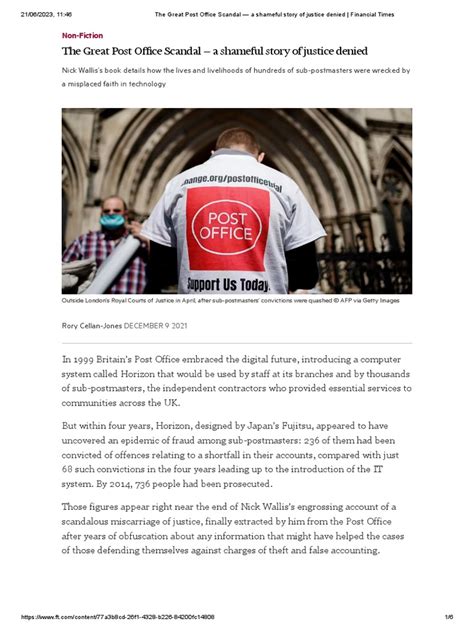In the recent unfolding of the Post Office scandal, it has come to light that the institution’s lawyers held a clandestine meeting with a judge to prevent the disclosure of critical evidence. This raises significant questions about the fairness and transparency of the legal process. At the core of the outrage is a fundamental tenet of the justice system: the right to a fair trial, which includes the disclosure of exculpatory evidence. The violation of this principle not only undermines confidence in the judicial process but also speaks volumes about the lengths to which powerful entities will go to protect their interests.
The scandal has incited passionate discourse among the public, encapsulated powerfully in reader comments. Some argue that this debacle underscores a dual system of laws—one for the elite and another for the general populace. This sentiment was poignantly captured by ChrisMarshallNY, who expressed frustration with the leniency that appears to be extended to those in power. He noted, “I really hope that folks get what’s coming…” His comment reflects a widely held belief that there is an urgent need for equitable accountability, where even those at the top are held responsible for their actions.
However, the issue of culpability is nuanced. Contributor calpaterson suggests that attributing the scandal solely to a social divide between the elites and the commoners oversimplifies the matter. He points out that many of those responsible were ordinary solicitors and technology contractors. This insight prompts a broader examination of systemic failures beyond social or economic lines. It implies that institutional rot can permeate various levels of the hierarchy, complicating the quest for accountability.
The discourse around this scandal extends to the broader context of accountability in leadership. The idea that top executives should be held responsible when things go awry was both supported and contested. Some, like ChrisMarshallNY, advocate for this kind of top-down responsibility. He argued, “Accountability begins and ends at the top… That’s (ostensibly) why [CEOs] get paid the big bucks.” In contrast, others like h0h0h0h0111 and ClumsyPilot question the practicality and fairness of this approach, arguing that not all failures can be attributed directly to top management.
A noteworthy aspect of the debate is the comparison with regulated industries, such as banking, where senior management can face criminal liability for institutional failures. YawningAngel’s comparison underscores a significant point: in highly regulated sectors, the stakes for failures are higher, and consequentially, accountability measures are more stringent. In the context of the Post Office scandal, this raises pertinent questions about why similar levels of accountability are not uniformly applied across all sectors, especially in public institutions.
The scandal also highlights broader issues within the justice system itself. There were references to the UK’s historical concept of ministerial and executive responsibility, which seem to have eroded over time. Pjc50 reminisced about a time when political figures would resign over failures, a stark contrast to the present day where taking responsibility appears to be a rare occurrence. This decay of accountability in leadership feeds into wider societal disillusionment with institutions, further deepening the mistrust seeded by such scandals.
In the world of law and justice, maintaining public trust is paramount. This scandal, with its secret meetings and cover-ups, delivers a severe blow to the credibility of the legal process. It serves as a stark reminder that for the rule of law to be meaningful, it must be applied uniformly and without prejudice. Addressing the Post Office scandal requires not only holding those directly responsible accountable but also reassessing and reforming the systems that allowed such a travesty to occur in the first place.
In summary, the Post Office scandal is not just a case of corporate and legal malpractice. It is a reflection of systemic issues within the UK’s legal and political machinery. As society grapples with the fallout, this scandal serves as a rallying cry for greater transparency, accountability, and justice within all tiers of the legal system. It underscores the need for a concerted effort to restore faith in our institutions by ensuring that all, regardless of their position, are held to the same standards of accountability and justice.


Leave a Reply